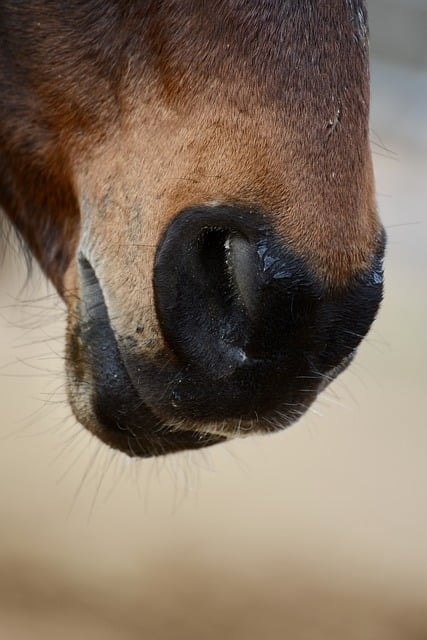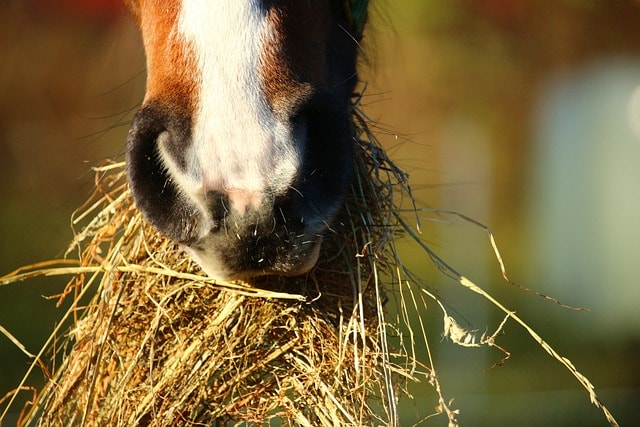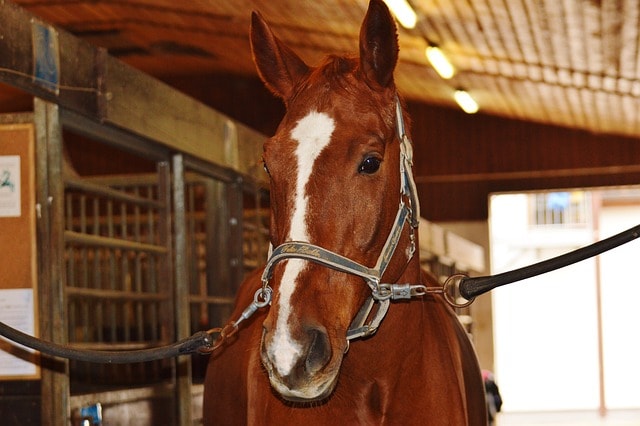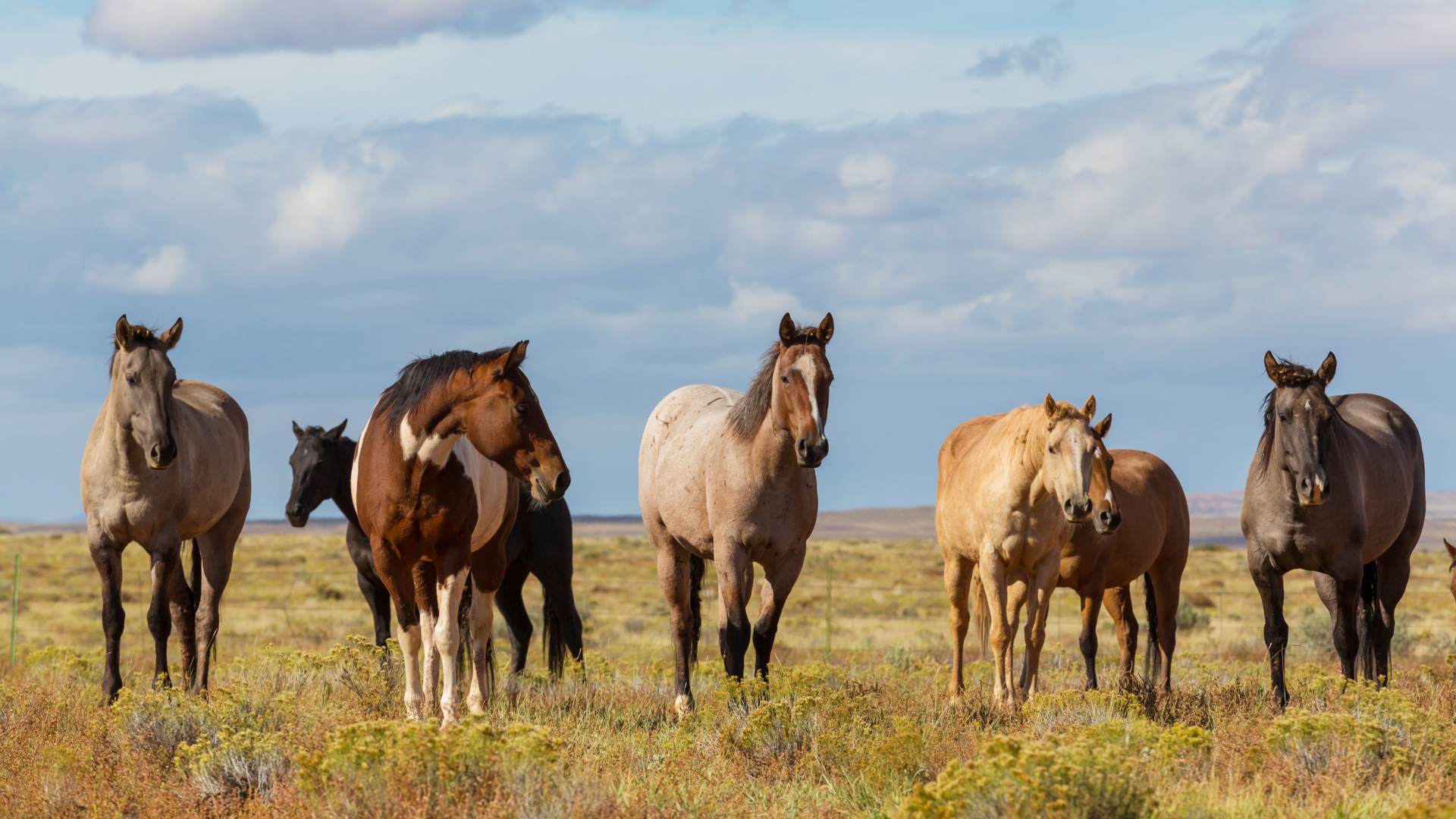Coughing in horses: causes, symptoms, treatment and prevention
Horses depend on their respiratory system functioning properly in order to stay healthy and maintain their performance. Coughing in horses is not just an annoying symptom, but often a sign of serious respiratory diseases that can have both infectious and non-infectious causes. It is important to recognize coughing in horses in good time, determine the cause and take appropriate measures to avoid long-term damage.
In this comprehensive article, you will learn everything you need to know about the causes, symptoms, treatment options and preventative measures against coughing in horses.

Coughing in horses: A protective mechanism with many causes
Coughing in horses is a natural reflex that is triggered by irritation of the respiratory tract. This reflex serves to remove foreign bodies such as dust, mucus or microorganisms from the respiratory tract. Unlike humans, however, horses cough less often because they have a higher irritation threshold. A cough only occurs when the respiratory tract is already more irritated or damaged. Therefore, every cough in horses should be taken seriously, as it often indicates underlying respiratory diseases.
Infectious Causes of Cough
Coughing in horses can be caused by various infectious agents, including viruses, bacteria and occasionally fungi. The most common viral infections that cause coughing include:
-
Equine influenza virus : A highly contagious disease that causes cough, fever and nasal discharge. Equine influenza is usually acute and requires prompt treatment.
-
Equine herpesvirus (EHV) : This virus is particularly dangerous because, in addition to respiratory diseases, it can also cause neurological disorders and miscarriages in pregnant mares.
Bacterial infections often occur as secondary infections when the horse's immune system is already weakened by a viral disease. A common bacterial infection is strangles, a highly contagious disease that causes severe coughing, fever and swollen lymph nodes. Mycoplasma is also often involved, causing respiratory infections.
Non-infectious causes of cough in horses
While viral and bacterial infections lead to acute cough, non-infectious causes are far more common and are often chronic in nature. The most common non-infectious causes of cough include:
-
Dust and mold : Dust generated from bedding, hay or feed in poorly ventilated stables is a major cause of respiratory irritation. Mold spores, which can develop in damp hay or straw, are particularly dangerous.
-
Harmful gases such as ammonia : Ammonia, which is produced from horses' urine, can irritate the respiratory tract and lead to serious illnesses in the long term.
-
Allergies : Some horses are allergic to dust, pollen or mold, which can lead to chronic inflammation of the respiratory tract.
Symptoms of respiratory diseases in horses
Coughing is often the first sign of a respiratory illness, but there are other symptoms that may indicate a breathing problem. Typical signs include:
-
Nasal discharge : Clear, watery discharge indicates a viral infection, while purulent discharge is a sign of bacterial involvement.
-
Increased respiratory rate : A horse that takes more than 20 breaths per minute is suffering from respiratory distress.
-
Noises when breathing : Whistling or rattling noises when breathing indicate a narrowing of the airways.
-
Increased abdominal breathing : If the horse uses its abdominal muscles more when breathing, this may indicate a chronic or serious respiratory disease.
Chronic respiratory diseases: COB and RAO
One of the most common chronic respiratory diseases in horses is chronic obstructive bronchitis (COB), also known as recurrent airway obstruction (RAO) or "stuffiness". This disease is usually caused by long-term stress on the respiratory tract, particularly from dust and mold. In this disease, the bronchi are chronically inflamed and narrowed, which leads to permanent coughing, shortness of breath and a significant reduction in performance.
RAO cannot be cured, but can be managed by providing a low-dust environment and special feed. Horses with RAO must be kept in optimal conditions for life to prevent further deterioration.
The role of stable hygiene in preventing cough in a horse
One of the most effective measures to prevent coughing and other respiratory diseases in horses is a clean and well-ventilated stable environment. A horse housed in a poorly ventilated stable with high levels of dust is more likely to develop respiratory problems. The following measures can help to improve stable hygiene:
-
Low-dust bedding : Use shavings or pellets to reduce dust exposure. Avoid straw, which is often dusty and may contain mold spores.
-
Regular cleaning of the boxes : Remove manure and wet bedding daily to reduce ammonia exposure.
-
Good ventilation : Make sure the stable is well ventilated, especially in winter when horses spend more time indoors. Open windows regularly or use ventilation systems.
Low-dust feeding: steam or water hay
Horses consume much of their diet in the form of hay, which often contains a significant amount of dust particles. One effective way to reduce dust exposure is to water or steam the hay. Steaming is particularly effective as it not only binds the dust but also kills potential mold spores.
Hay that has been treated with hot steam for 20 to 30 minutes contains significantly fewer harmful particles and is therefore more suitable for horses with sensitive respiratory systems. Watering is also a viable alternative, but should be done immediately before feeding.
Training and exercise: support for the lungs
Regular exercise is not only essential for the muscles, but also for the lung health of horses. Exercise in the fresh air allows the lungs to expand to the maximum, which promotes self-cleaning of the airways.
Horses that are outdoors and able to move freely every day have a lower risk of developing chronic respiratory diseases. Gentle exercise can also help support the respiratory system by stimulating mucus production and strengthening the immune system.
Nutrition and the immune system: Strengthening the horse's defenses
A strong immune system is key to preventing infection and respiratory disease. A balanced diet rich in vitamins and minerals strengthens the body's defenses. In particular, vitamins A, C and E and the trace element selenium play an important role in respiratory health. They help protect the mucous membranes and reduce inflammation.
Supplementary feed for horses can help to compensate for nutrient deficiencies, especially in winter when fresh grass is lacking. Our Multi Vital Powder is the perfect booster for your horse!
It is also important to ensure an adequate supply of raw fiber such as hay, as this supports digestion and the immune system.
Preventive measures against coughing in your horse
Preventing coughing and respiratory disease in your horse requires thoughtful and holistic stable management and careful care. It is particularly important to pay attention to a horse's environmental conditions, diet and exercise to promote healthy lungs and airways. The main preventive measures are described in detail below:
Low-dust bedding and regular cleaning of the stable
One of the greatest dangers to a horse's respiratory system is exposure to dust in the bedding and in the air. Dust particles, especially in combination with ammonia from urine, can irritate the horse's respiratory system and cause coughing. Choosing the right bedding is therefore crucial. Shavings or straw pellets are ideal because they contain significantly less dust than conventional straw.
In addition, the stable should be cleaned regularly. Damp bedding should be removed immediately, as this not only releases dust and ammonia, but can also encourage the growth of mold. A clean stable protects the horse's lungs from stress and helps prevent respiratory diseases.
Watering or steaming hay to reduce dust pollution
Feed, especially hay, is a common source of dust and mold spores. To reduce dust exposure, it is advisable to water or steam it before feeding. Watering involves immersing the hay in water for a short time to bind the dust particles. This is a simple and effective way to reduce dust levels.
Steaming hay is even more effective, as this not only binds dust particles, but also kills mold spores and bacteria. Steamed hay is particularly suitable for horses with chronic respiratory diseases such as chronic obstructive bronchitis (COB). The steam eliminates potentially irritating particles, which protects the horse's respiratory tract.

Good ventilation in the horse stable
Another crucial factor in preventing respiratory diseases is the air quality in the stable. Good ventilation ensures that harmful gases such as ammonia are removed from the air we breathe and that fresh air is supplied. Continuous air circulation is particularly important in winter, when horses spend more time in the stable. It is advisable to open windows regularly or install ventilation systems to promote air exchange.
Horses housed in poorly ventilated stables are at increased risk of respiratory disease because pollutants and moisture in the air put a strain on the lungs. Fresh, clean air is therefore one of the best protection mechanisms against coughing and respiratory problems.

Regular exercise in the fresh air
Exercise is essential for the horse's lung health. Regular physical activity, especially in the fresh air, ensures optimal ventilation of the lungs. This natural "self-cleaning" of the lungs plays an important role in supporting lung function and reducing the risk of respiratory diseases and coughing.
A horse's lungs are a highly sensitive organ that depends on regular physical exercise to provide maximum ventilation. Running freely in the pasture or daily training not only promotes general fitness, but also maintains the horse's lung capacity. Lungs that are well supplied with blood and free of mucus are better able to fight off pollutants and prevent infections. For horses with existing respiratory diseases, exercise is therefore doubly important, as it not only supports recovery, but also helps to maintain full lung function in the long term.
Supporting the immune system through a nutrient-rich diet
A balanced diet plays an essential role in preventing respiratory diseases. A healthy immune system can better fight off respiratory infections and helps prevent inflammation. In particular, vitamins such as A, C and E as well as trace elements such as selenium and zinc should be consumed in sufficient quantities to strengthen the mucous membranes of the respiratory tract and support the immune system.
Omega-3 fatty acids, which are found in linseed or special feed supplements, can also have an anti-inflammatory effect and promote lung health. Hay should always be available in sufficient quantities and of the best quality, as it is the most important source of food for horses.
Regular vaccinations of horses
Infectious causes of cough, such as equine influenza or equine herpes virus, can be prevented by regular vaccinations. Vaccinations not only protect the horse against acute infections, but also against possible complications and long-term damage that could be caused by these diseases. It is advisable to work with the veterinarian to draw up a vaccination plan that is tailored to the horse's individual needs and risks.
When should a veterinarian be consulted?
Coughing in horses can range from a harmless irritation to a serious medical condition, but it is important to know when to consult a veterinarian to prevent the condition from worsening. The following signs indicate that a veterinary examination is necessary:
-
Persistent or chronic cough : If your horse coughs for more than two weeks or the cough keeps coming back, you should call a veterinarian.
-
Fever or nasal discharge : These symptoms often indicate an infection that needs to be treated.
-
Shortness of breath or heavy breathing sounds : If the horse is having difficulty breathing, making a wheezing noise, or increasing the use of its abdominal muscles, this is an emergency that requires immediate medical attention.
Early diagnosis can help prevent serious complications and long-term damage to the respiratory system.
Cough Medicines and Medicines for Horses
In some cases, particularly bacterial infections or chronic respiratory diseases, the use of medication may be necessary for the horse to relieve the cough. Antibiotics are prescribed for bacterial infections, while anti-inflammatory drugs can help reduce inflammation in the airways.
Expectorants, so-called mucolytics, can also be used to facilitate the removal of mucus.
However, it is important that cough suppressants and other medications are only given under the supervision of a veterinarian. While medications can relieve symptoms, they do not always treat the underlying cause. Long-term healing usually requires a combination of medication, improved housing conditions and adjusted diet.
Herbs to help with cough in a horse
Herbs that are traditionally used in equine medicine offer natural support in the treatment of coughs. Certain herbs have expectorant, anti-inflammatory or soothing properties and can gently support the horse's respiratory system. Here are some of the most effective herbs:
-
Thyme : Thyme has strong antiseptic and expectorant properties. It helps to loosen stuck mucus in the airways and supports the horse's lung function. Thyme can be made into a tea and mixed into the horse's feed.
-
Ivy : Ivy is traditionally used for coughs because of its expectorant and antispasmodic properties. It is particularly effective for dry coughs and helps to cleanse the airways.
-
Fennel : Fennel has a calming effect and promotes the removal of mucus. Fennel can be given as a tea or mixed into food in dried form.
-
Licorice : Licorice is a proven cough remedy and has a soothing effect on the mucous membranes. It helps to reduce inflammation and relax the airways.
-
Anise : Anise helps loosen mucus and has an antispasmodic effect. It can be used in combination with other herbs such as fennel or thyme to support the horse's respiratory system.
However, these herbs should only be administered in consultation with a veterinarian or animal health practitioner, especially if the horse is already taking medication.
Respiratory diseases in horses: Important facts about the horse lung
The horse's lungs are a sensitive organ that can easily be damaged by environmental influences. Even the smallest dust particles can penetrate deep into the respiratory tract and cause inflammation. Horses have impressive lung capacity and are able to inhale large amounts of air during exercise. However, this ability also makes them vulnerable to respiratory irritation, especially in dusty or poorly ventilated environments.
Another important aspect is the slow healing of the horse's lungs. Once damaged, airways often need weeks or even months to regenerate. It is therefore particularly important to take preventive measures early on and to treat existing diseases consistently.
Prevention of chronic lung diseases
Chronic lung diseases such as asthma or COB are particularly stressful for horses and require lifelong care. Since these diseases often arise from long-term stress on the respiratory tract, prevention is the best way to avoid them. This includes creating a low-dust, well-ventilated environment, regular exercise and a strong immune system through proper nutrition.
Horses with chronic respiratory diseases often require special care to prevent further deterioration. This includes regular veterinary checks, the use of inhalation devices and consistent implementation of stable hygiene measures.
Summary
Coughing in horses should never be taken lightly. It can indicate a variety of causes, from harmless irritation to a serious respiratory disease. Early diagnosis and treatment are crucial to protect the horse's lungs and prevent permanent damage.

